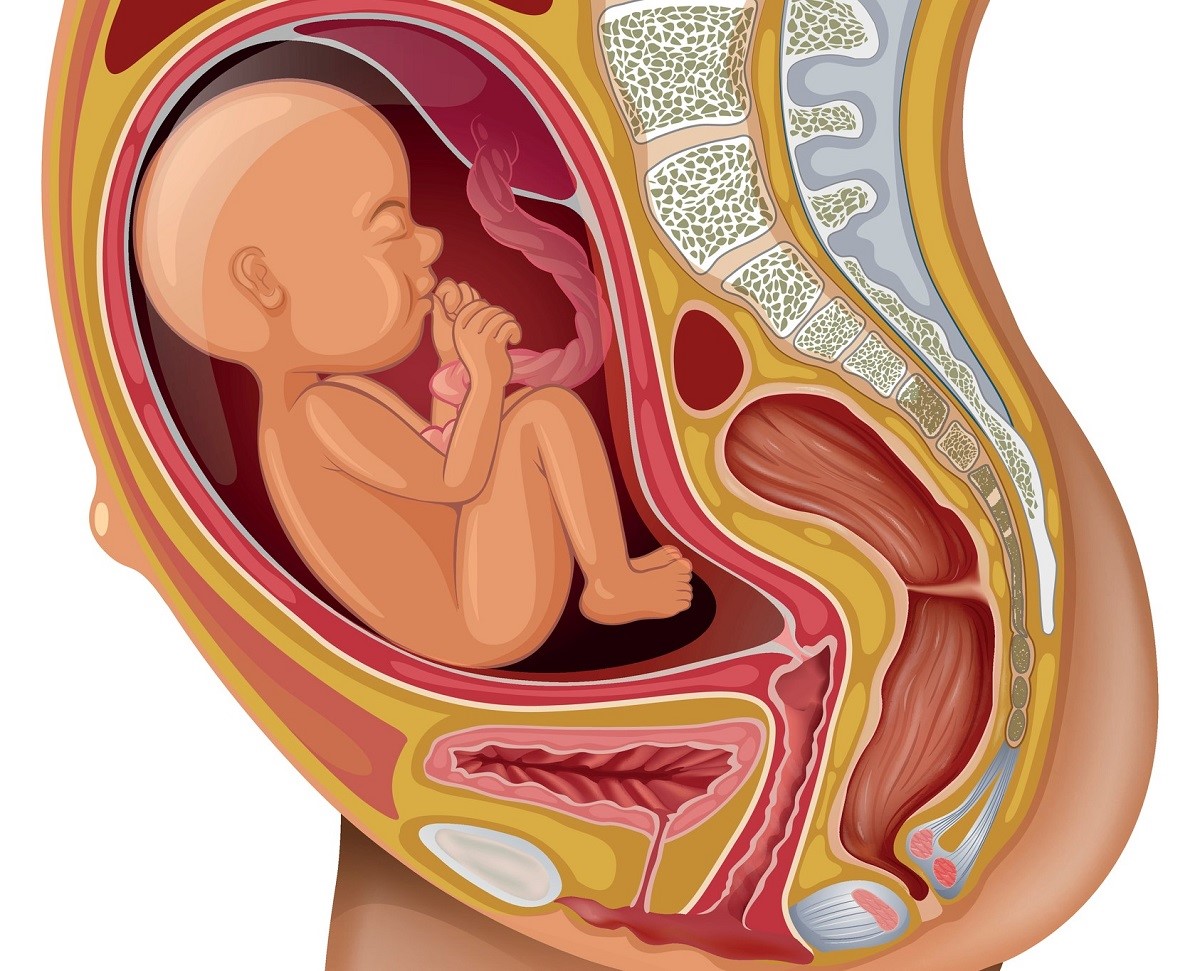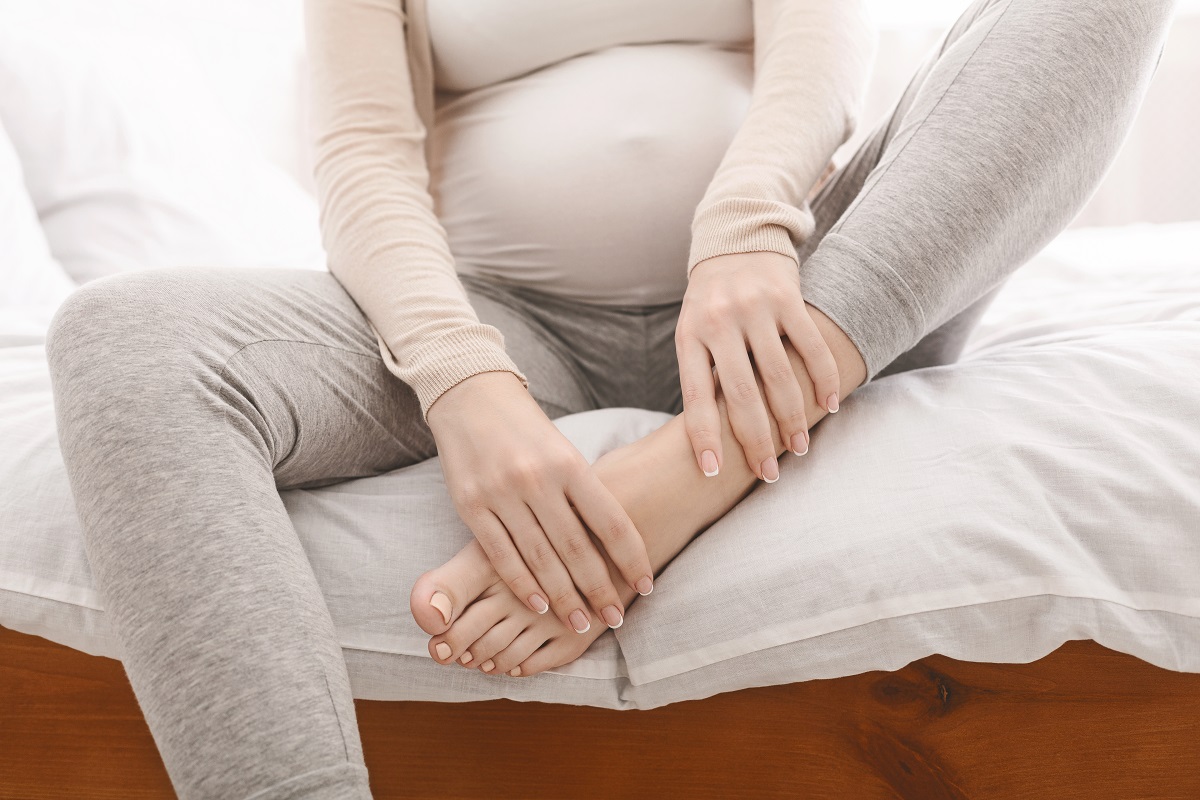- Literature
- Anatomy 2,third, revised and expanded edition: Radomír Cihák
- nhs.uk - Week by Week Guide to Pregnancy
- whattoexpect.com - 25 weeks of pregnancy
- verywellfamily.com - 25 weeks of pregnancy
- www.whattoexpect.com - When babies start to feel

Your belly is rounded and bulging outwards. The baby is comfortable in your belly, growing in it, gaining weight and making his movements known. He is responding to your movements, to touches and sounds. His nostrils are opening this week and his lungs are beginning a new phase of development.
You are 25 weeks pregnant, 6 months pregnant and in your second trimester.
Your baby is growing and gaining weight. You can feel it rolling and kicking more and more in your tummy.
You may be anxious to hold him in your arms and see his little face. You have a good few weeks ahead of you, but they will go by so quickly that before you know it, your due date will be here.
The most important thing now is that your baby stays in your tummy. That's what's best for him. He has a way to develop, grow and gain weight.
The fetus continues to grow and gain weight.
The baby measures approximately 35 cm and weighs 600-750 g.
His body is still thin and his skin looks wrinkled.
| Total length | Weight |
HC Head circumference in mm | BPD Head diameter in mm | AC Abdominal circumference in mm | FL Femur length in mm |
| 34.6 cm | 660 g | 230 | 64,5 | 201,8 | 44,4 |
For more information on fetal size, see the article: ultrasound in pregnancy: fetal size, what is fetal biometry?
Fat deposition has already begun and further deposition will smooth and firm the fetal skin.
The fat deposition will also cause the skin to become pinker in colour and lose its translucency.
The entire body of the fetus is covered with lanugo.
The hair grows on the head. It begins to store pigment, which begins to colour it.
The baby's face has already developed eyelids.
The nose has already formed. The nostrils, which were previously impassable, are opening. The fetal sense of smell is beginning to function.
In this week, the fetus begins to practice breathing. As the fetus practices breathing, it breathes amniotic fluid into the lungs, but there is no exchange of air in the lungs. The fetus receives oxygen from the placenta to oxygenate and nourish it. The lungs begin to function fully after birth, when the baby takes its first breath.
The baby can already smell the smells and aromas in the amniotic fluid.
Between 6 and 7 weeks, the fetus develops olfactory receptor neurons.
In the first trimester, the base of the nose is formed, two symmetrical nasal cavities. Later, the cavities open and join the mouth.
Further development connects the olfactory receptors in the fetal nose with the olfactory receptor located in the brain. The receptor enables the recognition of smells.
The smells or tastes of food that the mother consumes are transmitted to the amniotic fluid.
With the opening of the fetal nostrils and the subsequent inhalation of amniotic fluid through the nose, the fetus is already able to respond to different smells. This sense increases in the 8th and 9th months of pregnancy.
The fetal lungs develop in 4 stages.
The entire development of the lungs is a very complex process.
From the end of the 3rd month of pregnancy, the fetus from time to time performs breathing movements that help the lungs to develop.
Between the 16th and 26th week, the bronchioles form. The bronchioles are thin airways that branch many times in the lungs and are called the lung tree. At the developed stage, these branches end in alveoli. The alveoli are the lung chambers where oxygen exchange takes place.
Around the 20th week, the primitive alveoli begin to form. At the same time, the vascular supply is formed.
The second stage is now complete. The branches of the lungs have formed and are supplied by fine capillary vessels. However, the lungs still have two more stages to go. From the end of the 25th and the beginning of the 26th week of pregnancy, the third stage begins. The lung chambers are forming. These are air balloons in which the surfactant will be stored. The last stage, from the 36th week of pregnancy, continues into infancy.
The lungs are already producing surfactant. Surfactant prevents the lungs from sticking together and helps the fetus breathe after birth.
The hands are already formed. The baby uses them to grasp anything within reach.
Even though the fetus is still small, its little fingers have already developed their own unique grooves, or fingerprints. Fingerprints are different for every person, and no two fingerprints in the world are the same.
The spine and the parts that protect the spinal cord are still forming.
The baby fills the space in the womb. It no longer has as much room to move as in previous weeks, and therefore its movements are more intense. The baby also responds to louder sounds by kicking.
The fetus is surrounded by amniotic fluid, which it inhales, drinks and urinates into. Amniotic fluid is sterile and keeps the fetus warm.
The position of the fetus at 25 weeks is head up towards the chest and feet down. It gradually assumes the opposite position with the head towards the pubic bone ready for birth.

It happens that the baby swallows a lot of amniotic fluid and gets hiccups. You may feel this as a gentle tapping or rocking in the tummy. If the hiccups last longer, the baby may be restless and you may feel stronger kicks.
A baby born at 25 weeks gestation is considered extremely premature. It requires specialized care in intensive care units, where premature babies are treated for several months. Such babies already have a chance of survival, but face high health risks.
Your tummy has rounded and you feel like you are carrying a ball in your tummy.
You have gained about 7-8 kg so far during your pregnancy, and 11-18 kg if you are expecting twins. Many women start to gain more weight at this time than before.
Swelling of the face, arms and legs may indicate harmless fluid retention in the body, but it may also be incipient pre-eclampsia. Pre-eclampsia is more common in the 2nd trimester. If you have raised blood pressure, headaches and persistent swelling, tell your gynaecologist.

Sleep problems are often associated with discomfort. They are caused by a sagging belly, more frequent urination, or too much thinking by the expectant mom.
You may be familiar with it. You can't fall asleep because you're always thinking about something or it's harder to find a comfortable position.
When you finally find the right sleeping position, your baby decides to throw a party or you feel like going to the toilet again.
You may experience snoring while you sleep. In pregnancy, snoring is common even in women who have never snored before.
A common symptom in the second and third trimesters is hardening of the abdomen, called messenger or Braxton Hicks contractions.
Your body pumps 50% more blood than before pregnancy and 15% faster.
You may feel your heart pounding or stopping between beats. It may scare you, but in most cases it's normal and not dangerous. Still, tell your gynecologist about it.
If the palpitations are accompanied by chest tightness and shortness of breath, call the emergency services immediately. It may be heart disease.
Do not drink caffeine, drink water, rest, try relaxation techniques. This condition may be related to anemia, anxiety, thyroid problems.
Heartburn, indigestion and frequent burping.
After eating, burning in the chest, bloating and nausea may occur. Digestive problems are caused by the pressure of the growing fetus and the shifting of the stomach by the growing uterus. As well as the influence of pregnancy hormones and muscle relaxation.
It is recommended to eat small portions of food, not to overeat, eat healthy and easily digestible food.
In this period of pregnancy, women often experience restless legs syndrome. It causes you to constantly move your legs. This syndrome is caused by hormonal changes and iron deficiency. But do not despair, this symptom often disappears 4 weeks after giving birth.
To relieve this feeling, it is advisable to exercise and take dietary supplements such as iron, vitamin B12, magnesium.
Swollen and itchy hemorrhoids can bleed when constipated and when there is pressure on the stool. To soften the stool and make it easier to pass, it is recommended to increase the amount of fiber and fluids.
Pelvic pain occurs due to loosening of ligaments. Ligaments normally hold the pelvic joints together. During pregnancy, they loosen due to the action of hormones. This causes enlargement of the pelvis and preparation for childbirth. To relieve pain, use a support belt, practice exercises to strengthen the pelvis and its muscles, and Kegel exercises.
Iron deficiency anemia causes a feeling of fatigue, rapid breathlessness, and a feeling of palpitations. Foods such as leafy greens, broccoli, dried apricots, eggs, legumes, nuts and seeds are recommended to supplement iron naturally from the diet.
Urinary tract infections are common in pregnancy and may present with burning, stinging during and after urination, a feeling of incomplete urination, frequent urging to urinate, bloody, foul-smelling and cloudy urine, increased temperature and even fever.
Depression during pregnancy and postnatal depression are common. You feel down, irritable, sleep poorly and have an appetite. Try going for a walk in the countryside, talking to your partner or a friend or seek professional help from a psychologist.
Your hair grows fast, is shiny and healthy.
Tight skin on your abdomen can make you feel itchy and cause stretch marks.
Between 24 and 28 weeks of pregnancy, a screening glucose test, the oral glucose tolerance test (oGTT), is done. If you did not have it in the previous week, this test is yet to be done.
To learn more about the oGTT in the previous week of pregnancy, see the article.
You have no other special tests scheduled for this week, except for the oGTT performed at this time.
If you have an appointment, your doctor will examine you. He will check for swelling, measure your blood pressure and weight gain. He will test your urine for protein to see if you are developing pre-eclampsia. If you are worried or have any uncomfortable symptoms, contact your gynaecologist. He will advise you and check you and your foetus.
Also read other interesting articles about pregnancy:
Read more about the last weeks of pregnancy in the summary article.


